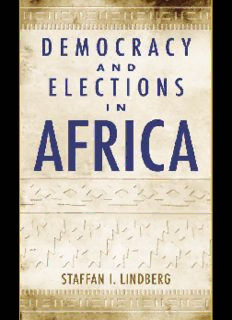
Democracy and elections in Africa PDF
Preview Democracy and elections in Africa
Democracy and Elections in Africa This page intentionally left blank Democracy and Elections in Africa staffan i. lindberg The Johns Hopkins University Press Baltimore © 2006 The Johns Hopkins University Press All rights reserved. Published 2006 Printed in the United States of America on acid-free paper 2 4 6 8 9 7 5 3 1 The Johns Hopkins University Press 2715 North Charles Street Baltimore, Maryland 21218-4363 www.press.jhu.edu Library of Congress Cataloging-in-Publication Data Lindberg, Staffan I., 1969– Democracy and elections in Africa / Staffan I. Lindberg. p. cm. Includes bibliographical references and index. isbn0-8018-8332-6 (hardcover : alk. paper) — isbn0-8018-8333-4 (pbk. : alk. paper) 1. Elections—Africa. 2. Democracy—Africa. 3. Africa—Politics and government‚ 1960– I. Title. jq1879.a5l55 2006 324.96′0329—dc22 2005024560 A catalog record for this book is available from the British Library. To Kasha and Omma This page intentionally left blank Contents List of Tables and Figures ix Preface xi 1 INTRODUCTION 1 The Role of Elections Why Africa? On Regimes On Elections and Democracy Preindependence and Postindependence Elections in African Nations Contemporary Africa’s Track Record Outline of the Book 2 ON DEMOCRACY AND ELECTIONS 21 Making a Conceptual Choice Defining Democracy Operationalizing Democratic Qualities of Elections Data Collection and Processing 3 ELECTIONS IN AFRICA OVER TIME 52 Frequency and Number of Elections The Democratic Qualities, on Average Democratic Qualities of Elections over Time Conclusions 4 THE SELF-REINFORCING POWER OF ELECTIONS 71 Going from Bad to Worse First, Second, Third, Fourth, and Later Elections A Panel-Group Comparison Conclusions viii contents 5 THE CAUSAL EFFECTS OF ELECTIONS 99 Democratic Qualities in Society A Missing Factor of Democratization Hypotheses and Causal Links 6 DEMOCRATIZATION BY ELECTIONS? 119 Elections Are Associated with Civil Liberties Analyzing by Countries Conclusions 7 COMPARATIVE PERSPECTIVES AND REFLECTIONS 143 The Transition Paradigm Corruption and Democratization Stateness and Social Citizenship Lessons on Consolidation Policy Implications The Power of Elections in Unfavorable Conditions Appendix 1. Overview of Elections in Africa, by Year 163 Appendix 2. Changes in Civil Liberties Rankings 166 Appendix 3. About the Freedom House Civil Liberties Index 171 Appendix 4. A Data Set on Elections in Africa 174 Notes 195 References 203 Index 223 Tables and Figures Table 1. Number of parties registered in last parliamentary election 13 Table 2. Length of most recent succession of elections as of 1 July 2003 15 Table 3A. Distribution of ratio indicators 48 Table 3B. Distribution of interval indicators 48 Table 4. Democratic qualities of elections in Africa 57 Table 5. Percentage of free and fair elections in four chronological periods 63 Table 6. Electoral participation in chronological four periods 65 Table 7. Electoral competition in four chronological periods 67 Table 8. Electoral legitimacy in four chronological periods 68 Table 9. Participation in first, second, third, and later elections 77 Table 10. Competition in first, second, third, and later elections 79 Table 11. Legitimacy of first, second, third, and later elections 85 Table 12. A panel-group, time-series comparison of elections in Africa 90 Table 13. Civil liberties ratings as of 1 July 2003, by electoral history 120 Table 14. Civil liberties ratings at first, second, third, and later elections 121 Table 15. Civil liberties development over electoral periods 125 Table 16. Descriptive statistics for independent variables 137 Table 17. The power of elections and possible confounding factors 139 Table 18. Overview of elections in Africa, by year 164 Table 19. Unit changes of ranking in civil liberties over electoral periods (data for Fig. 6) 166 Table 20. Percentage of elections followed by changes in civil liberties (data for Fig. 7) 166 Table 21. Unit changes in civil liberties over successive elections, by country 168 Appendix 4. A data set on elections in Africa 174
Description: